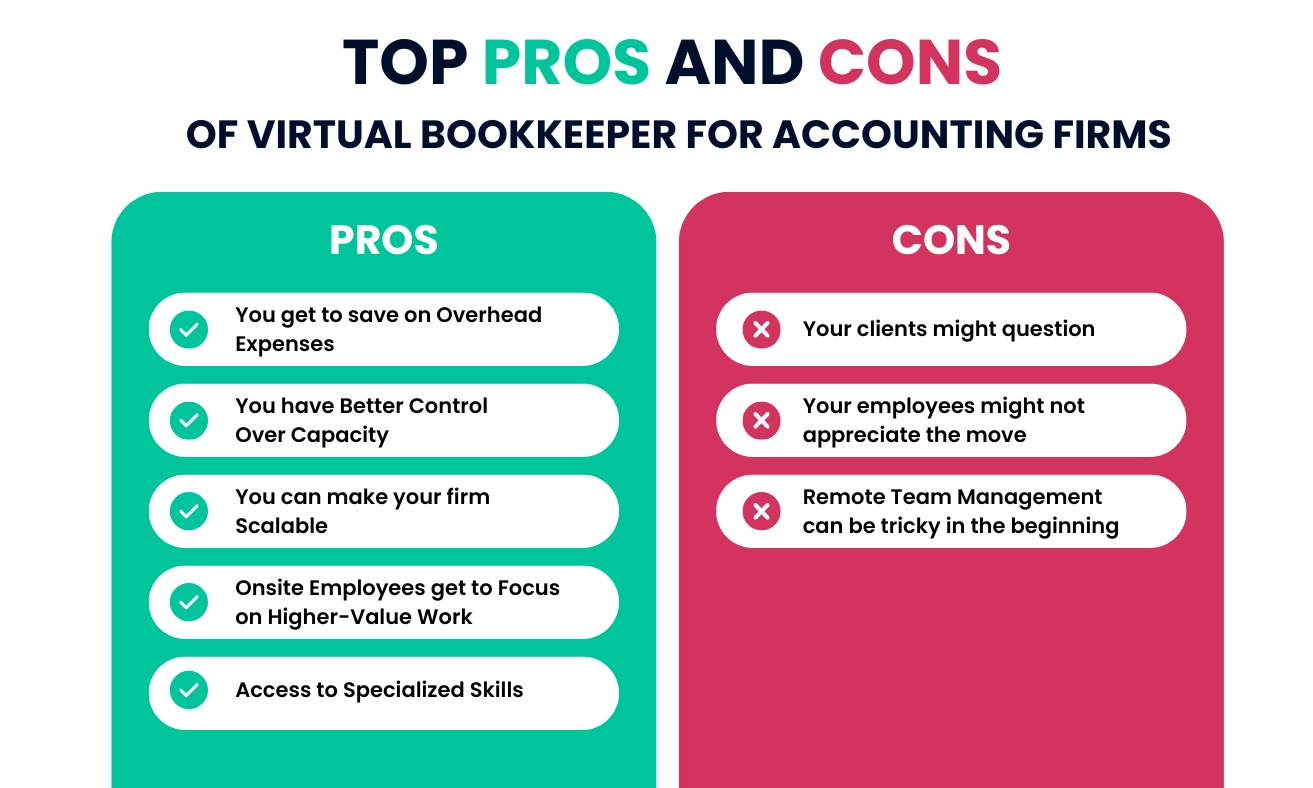
22 Accounting Social Media Posts for Firms (That Aren’t Boring)
Still posting boring “get your books done” posts for marketing for CPA firm? STOP. Get inspiration for accounting social media posts that work + post angle inside
If you are struggling in the world of accounting finding skilled local talent, chances are you have heard of virtual bookkeeper and accountants. Moreover, you might have heard that it has the potential to solve the talent issue and make your bookkeeping and accounting business scalable. But with so many accounting staffing options, how to know hiring a virtual bookkeeper is the right move for your business?
At Credfino, we provide virtual bookkeepers and accountants to help modernize accounting firms. While there are clear benefits, there are also challenges in building a virtual team, especially across borders.
Below we will examine the pros and cons of having virtual bookkeepers in your accounting firm.


A virtual bookkeeper is an accounting professional who handles bookkeeping tasks from a remote location, often from the comfort of their own home, rather than in a traditional office setting.
In the late 1990s, the advent of cloud accounting software revolutionized the way bookkeeping is done. This technological advancement allowed bookkeepers and accountants to manage and maintain financial records for businesses of all sizes without needing to be physically present.
Consequently, more and more employers and employees are preferring remote bookkeeping and accounting. In fact, accounting was the most common remote job posting in 2022.
The current talent crisis is putting bookkeepers and accountants in a favorable position.
With a clear gap between demand and supply, the available workforce is not only commanding higher compensation but also seeking work-life balance through the flexibility of working from home. This shift highlights the growing importance of virtual bookkeeping in today’s business landscape.
The current talent crisis is putting bookkeepers and accountants in a favorable position.
With a clear gap between demand and supply, the available workforce is not only commanding higher compensation but also seeking work-life balance through the flexibility of working from home. This shift highlights the growing importance of virtual bookkeeping in today’s business landscape.
Virtual bookkeeping, online bookkeeping, and remote bookkeeping—all these terms refer to the same concept and are becoming increasingly significant in today’s accounting landscape.
There are several effective ways to bring a virtual bookkeeper on board in your bookkeeping or accounting firm:
1. Freelance: Hire a virtual bookkeeper on a project basis through platforms like Fiverr or Upwork. As a result, the bookkeeper could be based locally or abroad, offering flexibility in your hiring process.
2. Offshore: Partner with an accounting staffing firm to secure a virtual bookkeeper from another country. In addition, you work with this bookkeeper as you would with any employee, providing training and receiving deliverables. Furthermore, if the initial candidate isn’t the right fit, the staffing firm can easily replace them without additional fees.
3. Staffing Agency (EOR): Hire a virtual bookkeeper in a different country through a staffing agency. However, you pay a one-time hiring fee and ongoing Employer of Record (EOR) fees for payroll management. Moreover, you’ll provide the necessary training and equipment. If the bookkeeper isn’t a good fit, you’ll need to restart the hiring process.
4. Remote: Hire within your own country but have the bookkeeper work from a different city or state. This approach expands your talent pool while maintaining proximity within the same country.
5. Outsource: Engage a third-party provider in your country to handle your bookkeeping services, allowing you to focus on other aspects of your business while ensuring your financial records are expertly managed.
Related Read – Read more about the offshore bookkeeping staffing models here
Hiring a virtual bookkeeper through freelance platforms or an outsourced bookkeeping model often comes with more drawbacks than benefits. Outsourcing can feel like a black-box approach, where visibility and control over the process are limited, and holding freelance bookkeepers accountable can be challenging. Additionally, using a staffing agency through an Employer of Record (EOR) can be expensive.
On the other hand, remote and offshore virtual bookkeepers offer a more reliable solution, delivering the desired results with fewer complications and greater control.
The difference between offshore accounting and remote (nearshore) accounting largely comes down to cost. Currency arbitrage makes it possible for accounting firms to hire a virtual bookkeeper offshore at a fraction of the cost compared to nearshore options.
While offshoring does present its challenges, partnering with a reliable accounting staffing provider and planning carefully can help you successfully navigate these obstacles and reap the benefits of cost-effective bookkeeping.
The shift to remote work during the COVID-19 pandemic showed that accounting and bookkeeping firms could operate effectively from home. This experience opened the door to a more flexible work setup, allowing firms to save on rent and office supplies. If you’re not ready to fully transform to remote work, consider a hybrid approach.
Keep key players in the office while switching rest of the team to remote accounting and bookkeeping, whether in the same country or abroad.
The savings on office space alone can be significant—renting space for 8 employees is far less expensive than for 30.
When client work flows in, hiring becomes essential. Overburdening your existing staff isn’t sustainable. Hiring in-office talent has its own set of limitations due to geographical constraints. For example, if your firm is in Southern California, you’re restricted to hiring locally, which may involve higher costs for relocation or commuting.
Hiring a virtual bookkeeper eliminates these barriers. You can access skilled bookkeepers at lower costs, as living expenses vary by state and country. This approach provides better control over your firm’s capacity to handle work, ensuring you have the resources you need without the location-based limitations.
As your firm gains recognition through word of mouth or effective marketing, the demand for your services increases. To accommodate this growth, you need a reliable team.
Virtual bookkeeping simplifies the hiring process, allowing your firm to scale efficiently. You can expand your team of virtual bookkeepers as your workload grows, ensuring you can meet client demands without compromising on quality. This is the most important benefit of hiring a virtual bookkeeper.
Imagine your team initially consisted of 10 accountants who have now become experts in their roles. They’re ready to take on higher-level tasks, but daily bookkeeping responsibilities are holding them back.
The next logical step is to free your onsite team from routine work and involve them in more valuable tasks that contribute to their growth. By relying on experienced virtual bookkeepers to manage daily deliverables, you can allow your in-house team to focus on strategic, high-impact projects.
Every industry has its unique challenges, and sometimes specialized skills are required to address them. For instance, eCommerce accountants might struggle with recording thousands of transactions for platforms like Amazon, wishing for automation without the high costs of software solutions like Snyder.
At Credfino, we’ve developed a data infrastructure that automates the recording of 50,000 eCommerce transactions per month, updating every three hours.
In industries where specialized skills are in demand, geographical restrictions can make finding the right talent difficult. Virtual bookkeepers allow you to tap into a global talent pool, ensuring you have the expertise needed to meet industry-specific challenges.
Virtual bookkeeping can raise data security concerns among your clients, especially when offshoring is involved. To manage this, it’s crucial to control the messaging you’re sending out. Clearly explain the data security measures you have in place, avoiding jargon, and emphasizing that both in-office and remote setups use the same secure software.
Whether you’re nearshoring or offshoring, introduce your team to your clients and be transparent in addressing their questions. While clients may initially view this as a cost-cutting measure, if you frame it as a strategic move to deliver high-quality work with faster turnaround times, they’ll likely support the decision.
How to make that happen? Read more here
While the flexibility of working from home is appealing to many, if some employees are given remote accounting benefits while others are required to come into the office, it could lead to dissatisfaction.
A hybrid work model offers a solution. Employees who were previously in the office five days a week could switch to three days, maintaining local ties. Those working in the office could be offered more high-level tasks and growth opportunities. Again, the key is in how you communicate this change.
If you’re new to managing a remote team, the transition may feel challenging at first. Face-to-face communication has its own advantages, but with the right tech stack, you can make this transformation smoothly. Proper tools and strategies will ensure that remote collaboration is just as effective as in-person teamwork.
Related Read – Top 24 Tools for Accounting Firms Building Offshore Teams
Virtual Bookkeeper has a plenty in its favor and can be an extremely effective way of increasing profitability. But the real worth lies in making your accounting firm scalable by having a better control over capacity management.
One thing is certain: when it comes to offloading your work on a virtual bookkeeper, you need to vet the candidate. Outsourcing and freelancing are not the best ways of hiring a virtual bookkeeper.
There are other options as we discussed above.
The pros of virtual bookkeeping are way more than the cons. Even the cons are manageable. Modern Accounting firms are switching to remote accounting to enjoy the benefits and stay ahead of the curve.
Related Read – Is Virtual Bookkeeping a Good Option for Your Accounting Firm?
I get it, finding the right virtual bookkeeping team can be tough. That’s where Credfino steps in. We’ve helped over 100 CPAs and accounting firms by understanding their specific needs. At Credfino, we offer a skilled and diverse virtual bookkeeping and accounting team, along with ongoing support to ensure your success.
Schedule a call to know how Credfino can help your accounting firm.
You have a couple of options when looking for a reputable virtual bookkeeper. You can hire directly through platforms like Upwork or LinkedIn. When doing so, look for certifications like Xero or QuickBooks, which add to the bookkeeper’s credibility. Check their work experience and consider running a background check to ensure reliability.
Alternatively, you can hire through an accounting staffing agency, which will vet the employee for you but comes with additional costs. If you’re looking to save on costs without sacrificing quality, consider partnering with a professional offshore accounting firm. These partners build teams in their home countries, train them in US GAAP, and make them readily available for US bookkeeping and accounting firms. This approach is both cost-effective and ensures quality work.
What’s holding your accounting firm back from scaling? Often, it’s the unavailability of staff or the fact that you’re too busy with day-to-day deliverables to focus on growing your business. By hiring a virtual bookkeeper and offshoring accounting tasks, you free up your time and gain better control over your firm’s capacity. Finding skilled talent becomes less of a challenge, allowing you to focus on scaling your business.
5 Ways a Virtual Bookkeeper Makes an Accounting Firm Scalable
The costs of hiring a virtual bookkeeper can vary. If you’re nearshoring and hiring someone located in the USA, you can expect to pay around $60,000 for a bookkeeper with medium-level experience. There might also be a one-time fee if you use a recruitment agency for hiring.
If you’re offshoring, you can either employ a full-time bookkeeper or purchase hours from a professional accounting staffing company. Both options typically come at a fraction of the cost compared to nearshoring, making them a more economical choice.

Still posting boring “get your books done” posts for marketing for CPA firm? STOP. Get inspiration for accounting social media posts that work + post angle inside

Social media for accountants helps firms grow by attracting better clients. But how to make it work and where to post – LinkedIn, YouTube, or other platform? Read here

Looking to hire an offshore accounting team? Here are 5 skills that you should look for before making the decision.